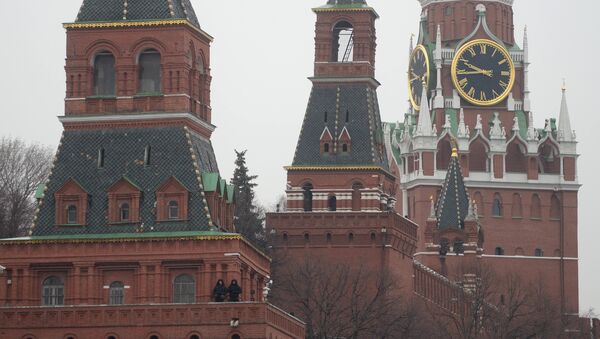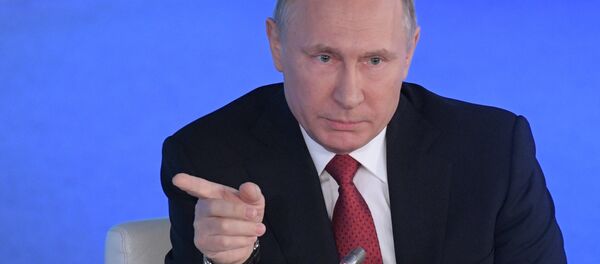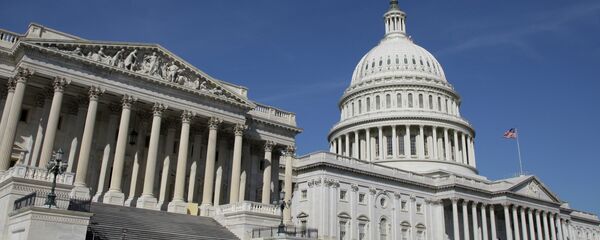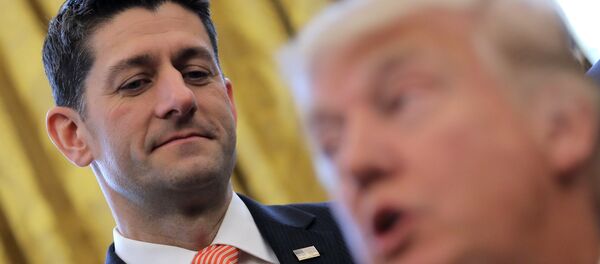On Tuesday, the legislation was approved by the House of Representatives. The chamber voted to attach Iran and Russia to a bill that originally targeted North Korea, which is what the Senate had requested. The bill passed by the Senate retains the stipulation that any attempt by the White House to lift or relax sanctions must go through the US Congress.
The restrictions target Russia's defense, intelligence, mining, shipping and railway industries, and restrict dealings with Russian banks and energy companies.
The EU described the new sanctions bill as a unilateral move and said Brussels is ready to "act appropriately" in response.
Russian President Vladimir Putin said that if adopted, the US anti-Russia sanctions bill would be an "extra-cynical move."
On Friday, Moscow delivered a response to the new sanctions bill passed by the US Senate. The Russian Foreign Ministry suspended the use of all US embassy warehouses and its compound in Moscow and also offered the US to cut down the number of its diplomatic staff in Russia to 455 people by September 1.
According to the Kremlin spokesperson, Dmitry Peskov, the responsive measures were personally authorized by President Putin.
There are several scenarios of how Russia could deliver a more substantial response if the new sanctions bill is adopted in the US, according to Nikolai Platoshkin, head of the International Relations Department at the Moscow University for the Humanities.
"The text of the bill itself contains a tip. It’s in section 237 which reads that the measures included in this act should not impede the activities of NASA [National Aeronautics and Space Administration]. So, let’s cut them off from space. Russia may stop transporting American astronauts to the ISS [International Space Station]. May they take a horse," Platoshkin said at a roundtable in Moscow.
The expert underscored that the expulsion of American diplomats would not have any effect.
"Why not to place our money in German bonds, for example?" he said.
Furthermore, Platoshkin said that Russia could stop exporting fertilizers to the US if the new sanctions are approved.
"We would not lose anything. Chinese companies could buy twice as much," he said, adding that in fact there is a wide range of possible responsive measures.
In turn, Dmitry Evstafyev, a political analyst and professor at the Higher School of Economics University, Russia should act very cautiously while responding to the new US sanctions.
"These sanctions are the result of the expanding sense of permissiveness and impunity in the US establishment. Of course, Russia should respond but should not shoot itself in the foot. Responsive measures should not be more damaging than the sanctions. Moscow should await the reactions from Europe and major US companies. The response could be symmetric or asymmetric. But the decision [to respond] should be made with a cool head," Evstafyev told Radio Sputnik.
Meanwhile, Russian Deputy Foreign Minister Sergei Ryabkov said Friday that Moscow is not ruling out any steps in retaliation to US sanctions.
"We are not ruling out any steps to bring overweening Russophobes to their senses, who are setting the tone on the Capitol Hill and are dictating such decisions," Ryabkov said.
The diplomat noted that Russia's set of measures in response to US sanctions is not limited to the reduced number of US diplomatic staff and the seizure of US diplomatic property in Moscow.





